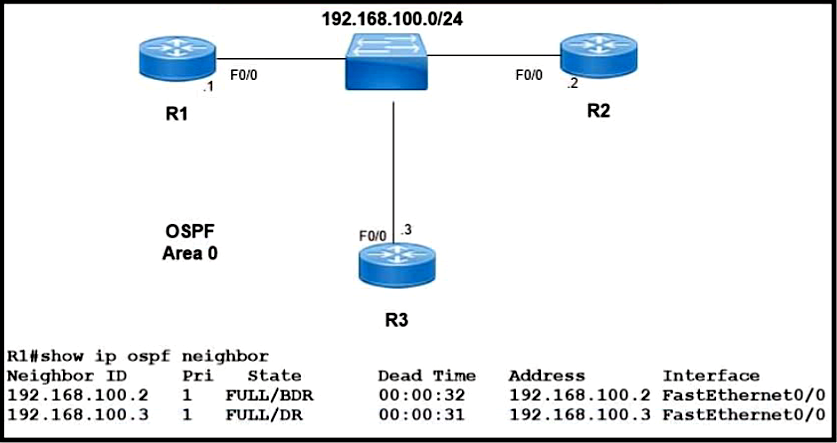
Refer to the exhibit. Which two configurations must the engineer apply on this network so that R1 becomes the DR? (Choose two.)

Refer to the exhibit. Which two configurations must the engineer apply on this network so that R1 becomes the DR? (Choose two.)
To ensure that R1 becomes the Designated Router (DR) in the OSPF network, the OSPF priority must be configured to the highest value on R1 and the lowest value on the other routers. Configuring the highest priority on R1 ensures it has precedence in the DR election. Meanwhile, setting the priority of R3 to 0 prevents it from participating in the DR/BDR election, solidifying R1's role as the DR.
Answer A is settings router 3 to have priority 0(0 means they are not allowed to participate in DR/BDR election) Answer C is making R1 to have a higher priority(default is 1 but putting very high number is only for safety reasons to ensure that the R1 is elected DR)
You can use the command Router(config-if)#ip ospf priority 200 to change the priority to 200 (The default value is 1) and then you use Router# clear ip ospf process command to enforce your changes...
even more then this , if you don't clear the IP OSPF process if the DR fails the new DR will be the BDR (router 2 ) and R1 will become the new BDR. It does not take into account priority even if we have it set at 200 . The answers given are incomplete.
C IS ALREADY SUFFICIENT , WHY WE NEED TO CHOOSE A ?
A & C are Correct. R1 must have the Highest priority, and thus R3 a low or lowest Priority.
once you configured on R1 priority 200, R3 already has a lower priority. Why it is deeded to set it to 0?
I think so
i dont think it would be needed also 200 make that router the DR
its necessary execute the comand # clear ip ospf process to change. not necessary remove R3 of DR/BDR election
WTH IS THIS QUESTION??? It request the R1 become a DR. Its not necessary remove R3 of the electon... sh1t of question.
A & C are correct
B and C are correct router-id 192.168.100.1 for R1 has not been set R1 priority to 200 will make it DR setting a priority to 0 will not allowed to participate in DR/BDR election
Brooooo...... He is executed the sh cmd on R1 brooooo... So no need to show ip
If Router ID is not manually configured, the highest IP address on any of the loopback interfaces is selected as Router ID.If there are no loopback interfaces the highest IP address given to any active interface is selected as router ID. You don't have to manually set it.
Answers a,c
Option A alone makes R2 the DR and R1 the BDR Option C alone makes R1 DR and R3 the BDR when applied together R1 becomes DR and R2 BDR since it has higher ospf priority than R3 I would exclude option B since it is not mandatory to set the router-id manually.
The router-id is set automatically using the loopback interface with the highest IP, if there's no loopback interface then we use the interface with the highest IP. You can also set it manually. When selecting DR, BDR, and DROTHER we look first at the OSPF priority (more priority value translates to higher priority in being selected as the DR.) If 2 or more routers have the same priority, we look for the highest router-id.